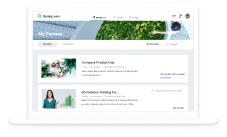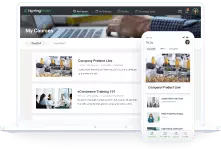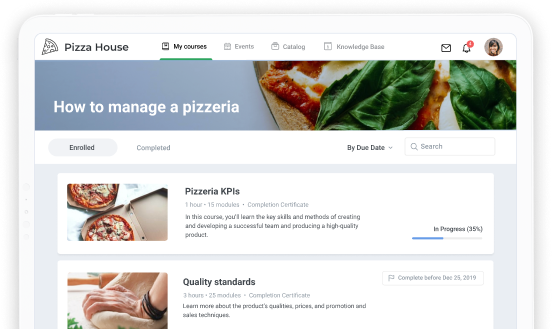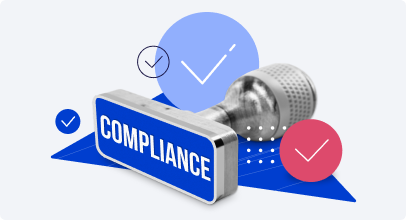The 7 Best Corporate eLearning Solutions for Business

In today’s ever-changing marketplace, employee training is a top priority for any business. It is an indispensable way to stay competitive and keep growing.
By moving training online, employers have an opportunity to reap maximum benefits from it with minimal expenditure. With specific corporate solutions, commonly known as learning management systems (LMSs), they can train hundreds of employees simultaneously and effectively manage and monitor the process. At the same time, their staff can build skills and professional knowledge whenever it’s convenient, without interfering with work duties.
However, choosing an LMS can be a challenging task, because there’s no one-size-fits-all option that will suit any company and cater to any business needs. But we hope this article will help in this regard. We’ll explain how to select the right platform depending on your goals and provide a detailed comparison of the finest solutions for each scenario.
How to Choose the Best Corporate eLearning Solution
When opting for a learning platform, you need to focus on two important criteria. The first one is your business needs and the types of employees you’re going to train. And the second one is the price of an LMS. Let’s look at all this in order.
What is the composition of your staff?
Employees can be roughly divided into two groups: frontline workers and back office staff. Companies that need to train frontline employees usually have a large staff (sales assistants, cashiers, and storekeepers, for example, if it is in the retail sector) that is in constant flux. Because of the high staff turnover, these organizations look for a solution that will let them provide the same training to all employees consistently at a low cost.
Businesses that need to develop back office staff, like economists, lawyers, marketers, and managers, want to build a learning culture in the workplace and are ready to invest more in training to help individuals and the company thrive. These organizations are searching for a solution that will allow them to implement continuous learning and provide all the functionalities needed to make it as effective as possible.
There are also companies that have to train both frontline and back office staff, and require a solution that will meet the needs of both.
How much does it cost?
All learning platforms can be broken down into three types in terms of pricing: low-cost, middle-cost, and high-cost solutions. Of course, low-cost vendors can be very appealing for the project budget since they offer the cheapest way to train employees. The cost of implementing such platforms starts at $1 per user/month. But you should understand the risks you may face.
These vendors often skimp on servers. That means if you train a great number of people at once or do any other operations with the LMS that turn to overhead for the server, the server goes down. As a result, the learning portal might be unavailable during mass employee training, or you may lose all your data if the vendor stints on backup servers.
Besides, low-cost providers typically save on technical support and sales services like conducting software demonstrations and delivering customer success. And you will definitely need experts’ assistance if you want to use the platform at full capacity and want to save the time required to learn the ropes on your own. Still, a low-cost platform can be a good fit if this is your pilot or a one-off eLearning project.
As for corporate eLearning solutions centered in the high-cost segment, they are veritable giants that, in addition to common LMS functionality, have many extra tools. For example, they may feature great capabilities for social learning, employee collaboration, and skill evaluation, and serve as learning experience platforms (LXPs). The cost of deploying such platforms is in excess of $100,000. These solutions are a solid choice for innovators – enterprises that want to play around with uncommon ways to manage employee development.
If you’re not looking for lots of bells and whistles and need a reliable solution that will work without a hitch, choose from mid-priced platforms. These LMSs usually provide a good balance between price and performance. The cost of implementing them starts at around $5,000.
The bottom line
To find a perfect corporate eLearning solution, you need to decide where you are in terms of training needs (who you will train) and how much you’re ready to invest in your project. By aligning these important criteria, you’ll narrow your choices down greatly. Then, you’ll just need to explore solutions that correspond to both of your requirements.
To make the choice even easier for you, we’ll provide a detailed review of learning platforms for training various types of employees.
The 4 Best Corporate eLearning Solutions for Training Frontline Staff
Training frontline workers is all about mandatory training initiated by the employer. It is always associated with firm control and strict deadlines. Since there is a great deal of employee turnover or churn, it’s crucial for companies to be able to train their staff quickly and simplify the process as much as possible.
Frontline workers usually don’t have PCs at their workplaces, so the most efficient approach is to let them study right on their smartphones. And because it’s not always easy to motivate them to learn, employers need specific tools that can impact their engagement and motivation.
Taking all this into account, the following are the principal features that an LMS should have in order to meet these requirements:
- Support of common content formats and the creation of simple courses
- Ability to set a deadline for a course
- Full control over the learning progress and outcomes
- Integration with the company’s HR system
- Tools for enhancing engagement in learning
- Mobile app
Now, we’ll compare the 4 best corporate eLearning solutions according to these requirements.
iSpring Learn

iSpring Learn is a powerful platform that’s perfectly suited for training frontline employees. It’s extremely easy to use and allows you to launch training in just one day.
The LMS supports a wide range of file types, including HTML5, PPT, PDF, DOC, XLS, MP3, MP4, and SCORM. Besides, it has a built-in tool for creating SCORM courses and quizzes. Just paste text, add images and videos, insert knowledge checks, and your course is ready to go. The authoring process takes minutes and is similar to writing a social media post.
The LMS is also integrated with a powerful authoring toolkit, iSpring Suite, that allows you to create versatile interactive content: courses, quizzes, role-plays, video tutorials, interactions, and more.
You can combine your courses and other learning materials into learning tracks that represent training programs and set due dates for every step of the learning track. If you need to assign a learning track regularly – to each new employee, for example – you can set up automated assignments. For instance, when an employee is added to the interns’ group, they are enrolled in the onboarding program automatically.
Learners can take courses right on their mobile devices. The LMS comes with a mobile app that maintains a 4.5-star rating on Google Play. It is extremely intuitive, so anyone can start using it on the spot. The best thing is that employees can train even when offline: the app can store their stats on the mobile device until they reconnect to the Web to transfer them to the iSpring database.
You can leverage gamification to make learning even more engaging. Award employees with points and badges when they take courses and complete tests, and motivate them to get better results by ranking them in a leaderboard.
iSpring Learn boasts strong reporting and analytics. It has multiple reports that enable you to track overall learner progress and results, see detailed info on how an employee is going through courses and assessments, and monitor how all the teams in your organization are performing.
Trainers can view the essential training statistics on individual and department learning progress on a supervisor’s dashboard. A quick glance is enough to know which team members ignore training or miss deadlines, and who successfully completes regular appraisals.

The LMS can be integrated with your HR system via API, so you can enter the data once and know that it is automatically synced between your platforms, removing room for error and keeping your data up to date.
Pricing: There are two types of subscription to iSpring Learn: Start and Business. The Start subscription is cheaper and comes with fewer features, but the LMS’s functionality is quite sufficient for training frontline staff. The cost depends on how many learners sign in to the platform during a given month – starting from $2.87/user/month for up to 100 Save and exitactive users.
iSpring Learn LMS
Automate corporate training and improve employee performance.
SAP Litmos

SAP Litmos is another solid corporate learning solution. Like iSpring Learn, it supports various types of files that you can upload as modules of a course. The platform also allows you to create simple text pages with information, embed content from other websites, and build quizzes and surveys. You can combine your courses into learning paths and set flexible due dates for them.
Reporting in Litmos is neither very neat nor terribly visual, but it provides all common stats for courses and learning paths. Reports can be generated either for content or team/user. There are some additional reports like Compliance Summary that will show you how compliance training is progressing, and Login Analytics that tracks when learners entered your learning portal and where they did this from.
Litmos also has a mobile app for Android and iOS that is simple to use and provides the same capabilities as the browser version. It also features a gamification element that awards badges and points for completing eLearning courses and allows learners to compete for a higher ranking
on the leaderboard.
The LMS is integrated with BambooHR and ADP so you can sync employees for learning and bulk administer HR.
Pricing: No prices are listed on the website. You’ll need to request a quote from the vendor.
TalentLMS

TalentLMS is a straightforward learning platform that can also be used to train frontline staff.
You can drag and drop videos, presentations, docs, and other files to your course, or upload SCORM 1.2, xAPI, or cmi5 content for more interactivity. You can also build quizzes in your browser and make them a part of your course.
Once your course is ready, you can assign it to your employees. To companies that would like to train multiple departments and branches, TalentLMS allows you to create unlimited sub-accounts and manage them all from one place. You can customize each sub-account so they tailor to different teams and audiences. In order for employees to complete courses on time according to your training plan, you can set time limits for courses. To keep your learners engaged from the start, you can gamify courses with badges, points, levels, and leaderboards.
There’s a mobile app available for Android and iOS that looks pretty good and allows you to complete courses offline. It also gives you access to direct messages, discussions, and gamification stats.
Reports in TalentLMS are created based either on content or selected users. You can see which courses were completed by the learners in a specific group or branch, or which learners completed a specific course. The platform also lets you create custom reports.
Like Litmos, TalentLMS has an integration with Bamboo HR, so you can sync employee data from one system to the other.
Pricing: The cost depends on how many active learners use the LMS each month. The initial tier begins at $69/user/month for up to 40 users. There’s also a free plan limited to 5 users and 10 courses.
Learn Upon

Learn Upon is another platform that’s quick to set up and is a good fit for training frontline workers. Like TalentLMS, it allows you to create and manage multiple portals for different branches from a single place.
You can create versatile learning programs easily by importing SCORM and xAPI courses, uploading videos, adding documents and presentations, and including VILT sessions. You can set due dates on courses to make learners take them faster.
The LMS doesn’t have a built-in authoring tool for creating interactive courses on the platform – you can assemble courses only from the ready-made content. But it has a specific tool for creating exams that you can add to your courses.
As with other learning platforms mentioned previously, Learn Upon gives employees the ability to access the content they need, when and where they need it, with a mobile app.
You can encourage your team to complete training with gamification. Award badges with every learning achievement, let employees gather points, and motivate them to compete through leaderboards.
For you to have a picture of training performance, Learn Upon offers a wide range of out-of-the-box reports that, with filtering, automation, dashboards, and integrations, work pretty well. You can track user progression, exam results, survey responses, training histories, and much more. The LMS allows you to import all the training results to your HR system when you connect platforms via LearnUpon’s API.
Pricing: No prices are listed on the website. You need to request a quote from the vendor.
The 4 Best Corporate eLearning Solutions for Training Back Office Staff
Training back office employees is a top priority for companies that would like to help their teams develop even more and retain highly qualified professionals so they will bring benefits to the business as long as possible. These companies typically don’t skimp on training expenses and adhere to the blended learning approach. In addition to self-paced learning courses, they conduct online meetings with trainers and classroom training sessions.
Besides, these organizations usually strive to create a culture of self-directed learning, so they want a platform that will allow employees to choose and self-enroll in courses they find useful for career growth. And last but not least, there should be specific tools that will help employers assess their employees’ performance and understand what they should master to become even more efficient or move up to a certain position.
To sum up, an LMS for training back office staff should have the following capabilities to meet business requirements:
- Blended learning support
- Tools for employee-driven learning
- Performance management tools
Now, we’ll take a look at the 4 best corporate eLearning solutions that fully meet these requirements.
iSpring Learn

We’ve already described iSpring Learn as a perfect solution for training frontline workers, but the best thing is that it is equally good for training back office employees. iSpring is integrated with two web-conferencing platforms: Zoom and MS Teams, so you can conduct online training sessions right on the LMS.
It also features a calendar in which you can schedule both web meetings and classroom training sessions. To make sure that your employees won’t forget about an upcoming event, you can set up automatic notifications. Specify when to remind your learners, and the system will send messages to all participants. The LMS also allows you to sum up the results of training – they show who attended the training and who missed it.
Besides, you can sync iSpring Learn training events with the Outlook Calendar. All information will be stored in one calendar to enable employees to plan their work schedules more efficiently.
To cultivate the self-learning culture in a company, there’s a catalog in which you can add books, additional courses, video lectures, and anything else you might find useful for your employees. They can look through the materials that are provided and self-enroll in them. You can also subscribe to iSpring’s ever-growing library of ready-made courses. It provides access to a great number of courses on must‑have skills for employee growth.
To evaluate employees’ competencies and сreate their development plan, you can leverage iSpring’s Performance Appraisal module that uses the method of 360-degree feedback. You can create questionnaires and collect feedback on an employee’s performance from people they work with – from subordinates to management. The platform will analyze the responses and generate a report.
Pricing: As mentioned above, there are Business and Enterprise subscriptions to iSpring Learn. iSpring’s Performance Appraisal module, as well as a range of other advanced features, are included only in the Enterprise subscription, so it’s the best fit for training back office staff. The cost depends on how many active learners enter the platform during a given month – starting at $3.14/user/month for up to 300 active users.
Bridge

Bridge is a corporate eLearning solution that combines the basic functionality of an LMS and robust performance management and career development features.
The platform allows you to conduct annual performance reviews and monitor employee productivity. It has a suite of tools for conducting one-on-one conversations and continuous check-ins, managing skills, aligning with company goals, and more.
You can help employees identify what drives and motivates them with a specific exercise, map employee career vision (Where do they want to go in their careers and what skills do they need to get there?), and create customized development plans to help employees realize their vision. The platform also lets you identify training gaps and growth opportunities quickly, keep assessments tied to the employee’s specific role, and access skill mastery data with a single click.
As a learning management system, Bridge enables you to conduct self-paced learning by assigning courses and learning paths to employees, as well as monitoring online and classroom training sessions. You can schedule training events for specific dates, times, and locations, invite participants, and track their attendance.
With Bridge, you can create online courses on your own, with the integrated Gomo authoring tool, or connect with content libraries like LinkedIn Learning, so your employees can self-enroll in courses. There’s also a Learning Library in the LMS that you can add courses to and create a categorized catalog of learning content that employees can self-enroll in.
Bridge also has a unique tool that allows trainers and experts to share knowledge by creating video tutorials right on the platform. These videos can be curated into custom playlists, so learners can easily keep track of what they’ve watched and watch that content again if desired.
Pricing: The pricing plan that includes learning management and performance management functionalities costs $10 per user, per month, billed annually.
Docebo

Docebo is a powerful learning platform that has all the necessary features for providing a solid blended learning experience. You can assign online courses to employees as well as plan ILT and VILT sessions. The LMS is integrated with a great number of web conferencing tools, including GoToMeeting, BlueJeans, Zoom, and Cisco Webex. You can choose the one you prefer to run training sessions online.
Unlike many competitors, Docebo is powered by Artificial Intelligence (AI), which helps deliver personalized learning at scale. There’s a course catalog that lets you create a customized set of courses and learning programs on your platform that are not mandatory, but you’d like to encourage your employees to take them. Users can browse the catalog and self-enroll in any courses they wish to take.
To find the most relevant content, employees can use the AI-Powered Deep Search or ask Docebo Learner Coach to recommend content. The LMS itself also provides personalized suggestions on training materials based on the kind of content a learner viewed previously.
Docebo also uses an AI engine in terms of skills management. You can ask your employees to identify their skills on the basis of their job and perform a self-evaluation on them. Once an employee completes this task, the platform suggests the content that will help them fill their gaps and deepen their knowledge in the areas they need. Managers can also suggest content they think will help employees improve their skills.
Pricing: No prices are listed on the website. You need to request a quote from the vendor.
Adobe Learning Manager

Adobe Learning Manager (formerly Adobe Captivate Prime) is another advanced corporate eLearning solution that’s a solid choice for training back office employees. Like the abovementioned platforms, it allows you to create unified learning experiences – giving your teams the flexibility to learn, virtually and in classrooms. With an interactive calendar on the homepage, employees can get a comprehensive view of the upcoming in-person and virtual sessions.
You can conduct your online classes right from the LMS through out-of-the-box integrations with MS Teams and Adobe Connect. You can also integrate other popular web conferencing tools via API.
Adobe Leaning Manager also has a robust artificial intelligence (AI) and machine learning (ML) engine designed for you to create a unique learning experience for each learner. The system suggests relevant learning programs based on users’ profiles and learning preferences. Learners can also browse their feed and see courses that are trending among their peers.
Employees can accept the platform’s recommendations or search for the necessary content among available training programs on their own. Trainers and admins can upload content to the LMS and/or integrate it with third-party providers, such as LinkedIn Learning, Harvard ManageMentor, and getAbstract, and let learners take their courses – all within a single learning platform.
The unique feature of Adobe’s LMS is skills maps that are groupings of the skill sets, knowledge, and traits of an employee. These skills help companies set or raise performance expectations for their employees. When a learner completes the assigned courses and learning programs with skill credits assigned to them, they achieve skills. They can also increase skills by self-enrolling in courses that pertain to a particular skill.
Pricing: No prices are listed on the website. You need to request a quote from the vendor.
In Closing…
Modern learning management systems provide great opportunities for employee training and development. Many of them have similar functionalities, but there are some specific features that make an LMS a better fit for training either frontline workers or back office staff. If you’re looking for a corporate eLearning solution that will let you effectively train both types of employees, opt for iSpring Learn LMS. Sign up for the LMS demo now and our experts will show you how iSpring Learn will help you automate eLearning in your company or solve your specific training project task.










